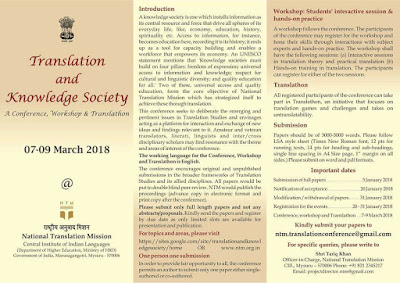Three-day International
Conference on Commonwealth Literature
8-10 February 2018
Osmania University,
Hyderabad
Concept Note
“A room without books
is like a body without soul.” (Cicero)
In today’s
multicultural and multi-lingual society, the focus of literary studies has
drastically changed. The focus has shifted to postcolonial theory, lesbian and
homosexual writing, diaspora, ethnic studies and corporate fiction. In the last
three decades, writers across the globe have enriched the literary scene by
dealing with contemporary themes and issues. Some of these writers are Margaret
Atwood, Peter Carey, David Malouf, J.M. Coetzee, Gunter Grass, Kazuo Ishiguro, Milan
Kundera, Rohinton Mistry, Toni Morrison, Ben Okri, V.S. Naipaul, Michael
Ondaatje, Zadie Smith and Ngugi wa Thiong’o. Today Indian English literature
has registered a remarkable growth and many of our writers like Anita Desai,
Bharati Mukherjee, Amitav Ghosh, Vikram Seth, Salman Rushdie and Jhumpa Lahiri
have achieved international recognition. As Indian writing in English has come
of age, it is time to examine where it stands in terms of other literatures in
the world, and what are the reasons of its popularity.
Comparative Approach
Some of the books
published during last three decades have made indelible impact on us. We now
are the citizens of the world and can no longer afford to neglect the
excellence of other literatures in the world. Just as national literature is
the reflection of the national history, so is the world literature a by-product
of comparative literature. We are glocal—both local and global. While comparing
Indian writers/ movements with overseas writers/ movements, we are mainly
concerned with relationships, resemblances and differences. Such an approach
will give wider dimensions to the realm of contemporary literature.
Humanities/ Social Sciences
The conference is both
comparative and interdisciplinary in character. Literature is closely related
to humanities and social sciences. Certain political and social movements have
all-pervading influence on common people as also on literary milieu. A writer
is essentially the conscience bearer and moral watchman of his people. The
conference will therefore discuss, apart from literature, like Terrorism,
Popular Culture, Human Rights, Feminism, in all spheres of knowledge. Papers
are therefore invited from scholars in the disciplines of History, Political
Science, Philosophy and Psychology, within the larger framework of the theme of
the conference.
Call for Papers
• Landmarks in Indian and World Literature
1990-2018
• Globalism and Literature
• Diversity, Multiculturalism
• Local, Glocal and Global Identity
• Feminism
• Eco-Criticism
• Diaspora literature
• Minority literature
• Subaltern Studies
• Comparative literature
• Special sessions on Canadian, Irish,
African and Australian literatures
Highlights
• Renowned Keynote Speakers and Resource
Persons
• Plenary Lectures
• Panel Discussions
• Release of the Journal
• Readings by Creative Writers
• Book Releases/Book-Exhibition
• Conference Dinner
• Cultural Evening
Creative Writing Session
A number of creative
writers will participate in the session. Ms. Roswitha, German writer in India,
will deliver a special lecture on her recent novel.
Publication
Select Papers
presented at the Conference will be brought out as a volume of essays—an ISBN
publication—or as a special issue of the U.G.C.-approved bi-annual journal The
Commonwealth Review. However, articles of only the subscribers will be
considered for inclusion.
The aim of this
International Conference is to encourage academics, scholars and practitioners
representing an exciting diversity of countries, cultures and languages to meet
and exchange views in a forum encouraging respectful dialogue.
Objectives
The deliberations of
the conference will be useful for sharpening the research tools and strategies
by the teachers and research scholars. The conference will discuss
multiculturalism focusing on the ideological issues of caste, gender, religion,
and the social movements affecting the new literatures written in different
languages and regions with a view to bringing out the multicultural diversity
of the globe. It is hoped that the conference will enlighten the delegates and
scholars about the nature of the new literatures, the ideological and cultural
deep structures lying behind them, and the way the multiculturalism of the
writers has questioned the established beliefs and systems to uphold humanism
based on the values of liberty, equality, and fraternity.
The City of Hyderabad
Hyderabad, the Capital
of Telangana, is a historical city—well-known for pearls. It is a seat of
learning and has more than seven universities. A multicultural city, it is
famous for grandeur and royalty. Places to visit include Char Minar, Salar Jung
Museum, Fort and the Lake. Weather in November is pleasant. Accommodation will
be provided in the OUCIP Guest House on twin-sharing basis.
Book Exhibition
There will be a Book
Exhibition where members can display their publications. Members who wish to
get their books released may send copies of the books preferably in advance.
What to send
A 200-word abstract
should be submitted by 30 December 2017 along with the information in this
order: a) author b) affiliation c) email address d) title of the abstract.
Abstracts may be sent to: iscstudies@gmail.com
Acceptance
Acceptance will be
sent by the Academic Committee, within three days from the receipt of the
abstract. Submission of registration fee and travel bookings may follow.Certificate
of Participation in the International Conference will be given to all
registered delegates. Convener, Academic Committee: Professor Jagdish Batra,
Jindal Global University. Sonepat.
Important Dates
Abstract Submission: 20 December 2017
Registration Fee: 10 January 2018
Registration Fee
Foreign delegates
USD 300, includes
accommodation for 4-5 nights, hospitality and conference kit
India delegates
Rs. 3500 per person.
It includes Conference fee, accommodation, Conference kit and hospitality.
Rs. 2500 per person,
not needing accommodation. It includes Conference fee, Conference kit and
hospitality.
Research scholars, not
employed and below 30: Local Rs. 2000;
Outstation with
accommodation Rs. 3000.
Spot registration will
not be possible.
Late Fee after 10
January 2018: Rs. 300
Kindly note that we
are not in a position to assist with the conference travel or subsistence.
Participants are requested to approach their institutions for travel grant and
conference fee.
For all queries,
contact:
Secretary, ISCS:
iscstudies@gmail.com
Dr. Suman
Bala:balasum@gmail.com Mobile:
0-9891097657











